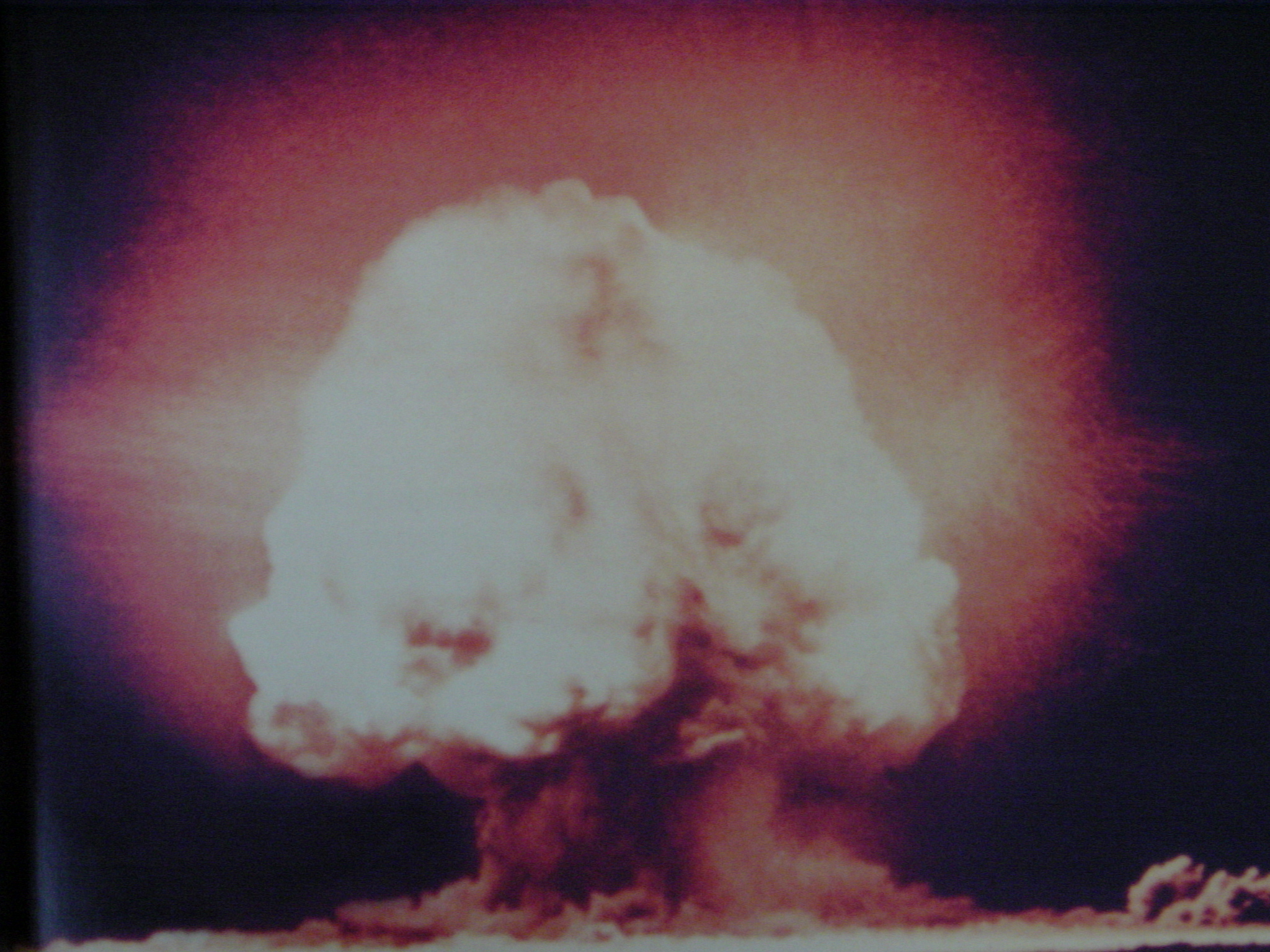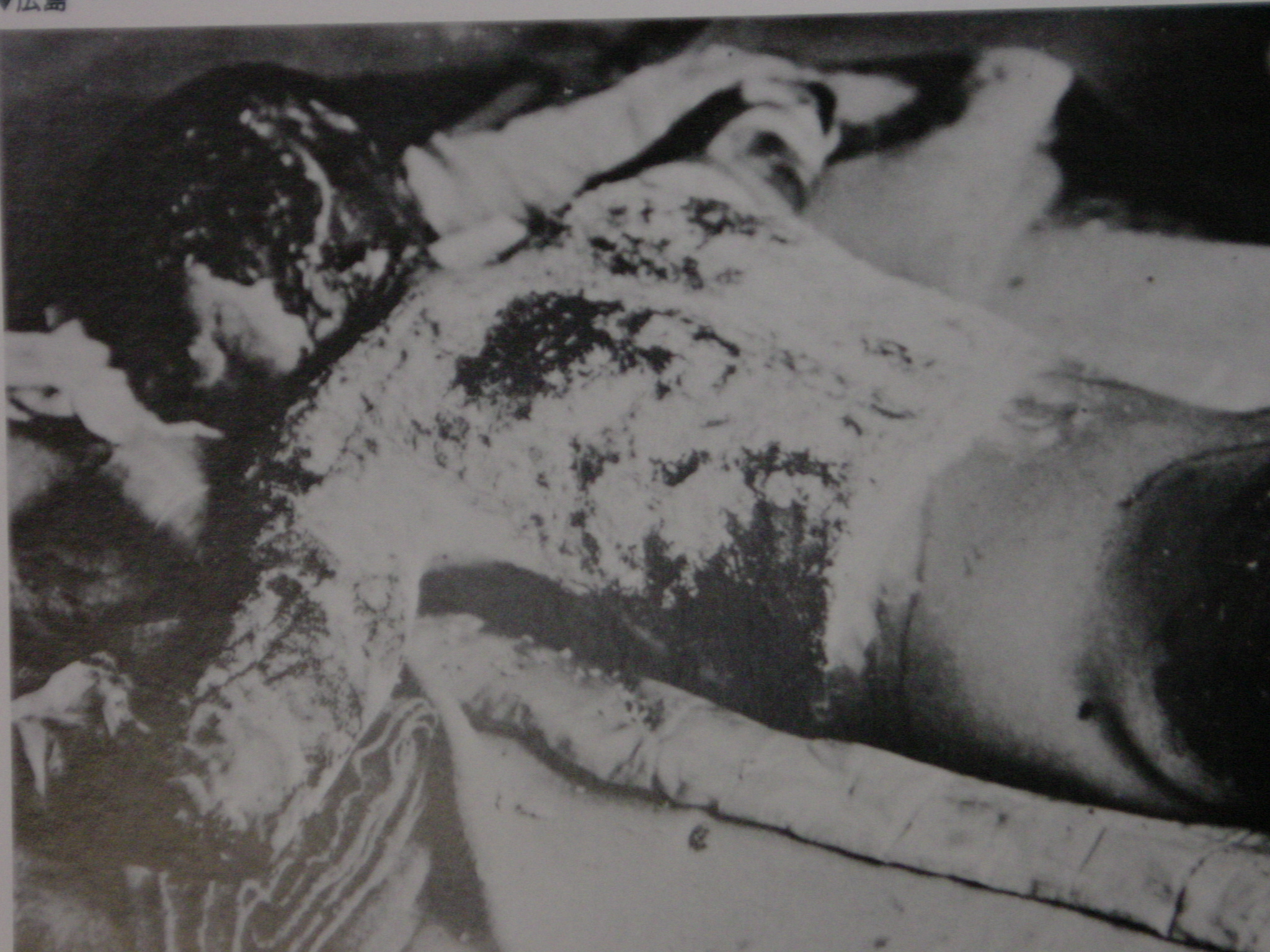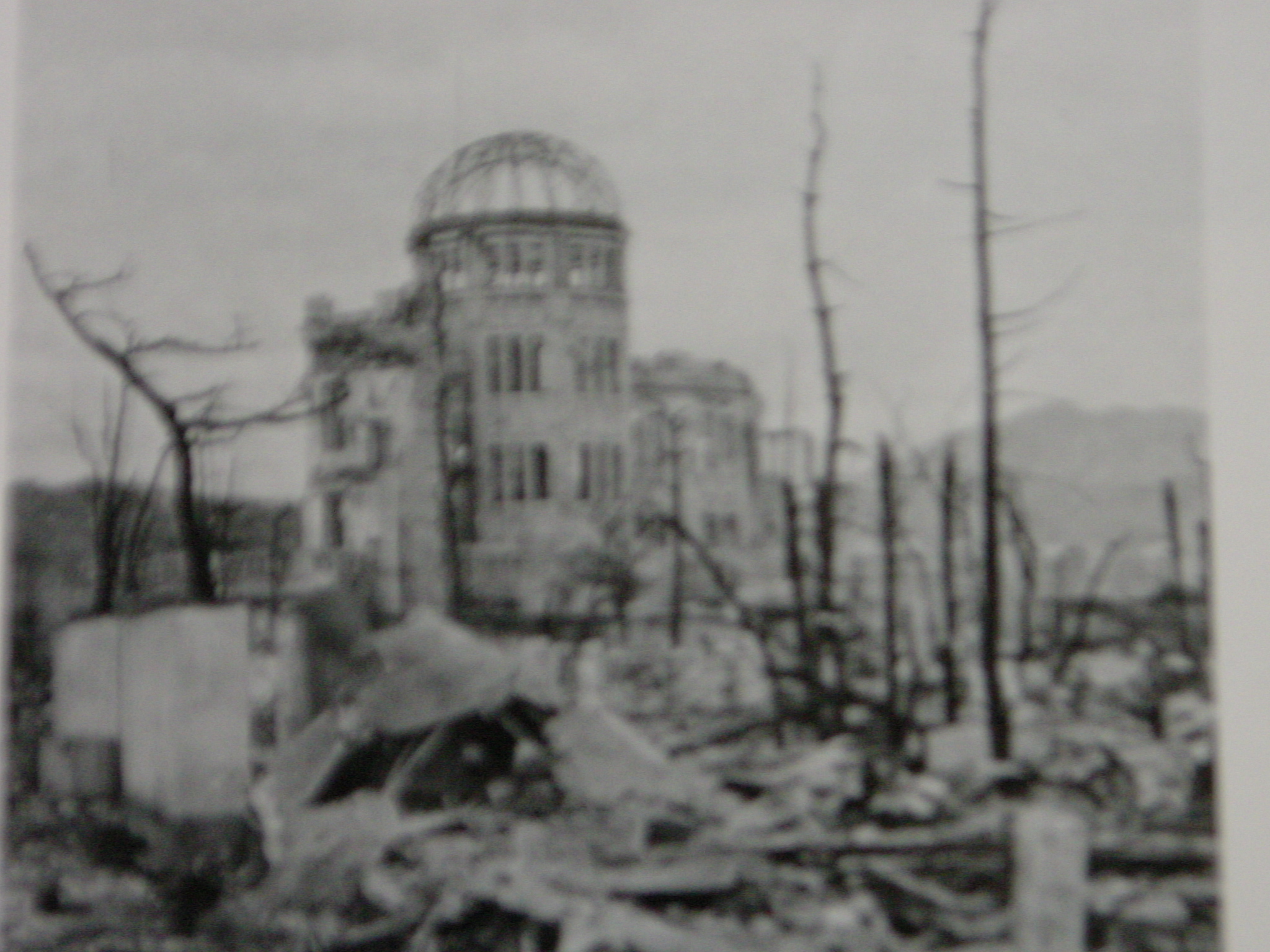

 |
Memoirs of Bereaved Families |  |
 |
||
| Mushroom cloud |
| Foreword | ||
| Most hibakusha, or A-bomb survivors, did
not want to recall the tragedy of the A-bombing or talk about it. I did not, either, for a long time. In 1967, one of my friends who had survived the A-bombing suddenly died from leukemia. His death gave us the idea of keeping records of survivors' experiences and handing them down to the next generation. In those days, we did not have much information about what happened to my school after the A-bombing, especially how each student died. Although more than 20 years had already passed since the A-bombing, we decided to send out questionnaires to the bereaved families and ask about how our friends died. We received a lot of responses, giving a vivid description of the A-bombing. They were filled with sorrow and grievous cries of the bereaved families. Let me introduce some memoirs here. |
||
 |
 |
 |
| A man with burns over his entire body (photograph by Masami Onuka) |
Atomic Bomb Dome after the bombing (photograph by Sigeo Hayashi) |
Memorial Monument for the First Hiroshima
Prefectural Middle School. Names of the teachers and students died of the A-bomb are carved. |
| Memoir of Mr. Imoto's Mother | ||
| Memoir of Mr. Asano's Father | ||
| Memoir of Mr. Sakamoto's Aunt | ||
| Memoir of Mr. Ota's Father | ||
| Memoir of Mr. Tada's Sister | ||
| Memoir of Mr. Matsuda's Father |
| Memoir of Mr. Imoto's Mother | ||||
| My son said, "I was A-bombed in my classroom.
Instantly after the flash, I lay down
on
my face beside the platform. Mr. Okamoto
fell and weighed on me. The ceiling
had fallen
on us and it got as dark as night.
After
a while, Mr. Okamoto broke through
the roof
and got out, and I felt much better.
When
I broke through the ceiling and got
out,
fire flames were coming from the direction
of City Hall to the next classroom.
In a
moment, fire started. There were a few classmates trapped in the room. They were crying for help, and I told them that I would help them after I got out. However, the fire spread rapidly and I could not get closer to them." He said he was sorry that he could not help them. That evening, he slept in the potato field in the school grounds with his three friends who had also escaped from the classroom. The next morning, he walked back home to Nakayama. His hair started to come off around August 20, and I brought him to a temporary medical center. We were told that it was alopecia (hair loss) and that he should lie quietly in bed because his heart was failing. In a few days, he had fever and canker sores. His gums started bleeding. On Aug 28, his red blood turned darkish, and he turned deadly pale. He was conscious until one hour before he died. He left his will and died. |
||||
| Memoir of Mr. Asano's Father | ||||
| My son was inside the school building when
the A-bomb exploded. Immediately after
a
very strong flash, choking white smoke
grew
dense everywhere. The smoke cleared
away
soon. He said that he had crawled out
of
the toppled building and had helped
some
classmates get out of the debris. He
was
eventually separated from them. He
fled toward
Ujina alone. The next day he came home
to
Hakushima detouring around the city
center.
He wasn't visibly injured. But about ten days after the bombing, he developed canker sores and lost his appetite. Then several days later, his hair started to fall out, purple spots appeared, and his gums and nose bled. There was very little treatment we could do for him. Then he had bloody stools and urine along with fever, before he died on August 28. |
||||
| Memoir of Mr. Sakamoto's Aunt | ||||
| My nephew was in his classroom when the A-bomb
exploded. He desperately escaped to the school
grounds and stayed there lying on his stomach
with his mouth and nose covered with his
towel. Then the black rain fell. Looking
up, he found everyone around him dead. Getting
up to his feet and starting to walk, he was
stopped by a man, "I am a school principal.
Would you help me get away from here?"
So he fled to the Red Cross Hospital with
the headmaster. At the hospital he gave a
hand in many ways to help A-bombed people.
Then he went to Ujina, and there he managed to let his grandfather, a doctor in Noumi Island, know that he was alive, before getting home. From home he went to his ruined school in Hiroshima repeatedly to give a hand to carry away victims and to clear up the school premises. When students' bereaved parents visited the ruined school, teachers would call him to meet them, saying, "This is the only student who has survived the bombing." Every bereaved parent gave him an envious look. He said that it was very embarrassing. He was not injured or burned anywhere. But about two weeks after the bombing, he developed every acute symptoms caused by the A-bomb, such as hair loss, fever, canker sores, purple spots, diarrhea, vomiting, and bleeding. When he met visitors, he put on his school cap even in great pain, because he felt it too embarrassing to show his bald head to them. Before developing acute symptoms, he kept whining every day, "I'm very tired." or "I want to eat something good." Once the acute symptoms began, he was in continuous agony. He strained to try to roll over with great efforts, saying, "Damn, I could roll over yesterday, but I can't today. What should I do." When he heard his grandfather say that he couldn't live through the night, he prepared for his own death, to leave his belongings to each of his friends, his sisters, and even our family's hired hands. He asked me to get him a piece of paper and a pencil to write down the list, just saying with a great effort, "Paper. Pencil." I handed those to him, but he had no strength left to write by himself, so he dropped them aside. However, he amazingly remained clear until his last moment. I can't bear any more tragedy like this. I strongly hope to have this bitterness known to the world and world peace realized. |
||||
| Memoir of Mr. Ota's Father | ||||
| To search for my son, I left my work place
in Minami-kanon for Dobashi, where he was
supposed to be mobilized. I walked around
the area, but in vain. Expecting that he might have already gone home, I returned home to Onaga. But he hadn't returned. He didn't come home even when night fell. I didn't sleep a wink that night, remembering the hell-like scenes I had seen during the day; a lot of children wandering around the town, feebly calling for their parents with their skin ragged. Early the next morning, with my friend and a stretcher, I started searching for my son, stopping by as many relief centers as possible. Late that evening, at Koi National Elementary School, we finally heard his voice respond to our calling his name. We rushed upstairs from where his voice was coming, stumbling as if we had been drawn into the classroom. On taking a look at us, he said cheerfully, "Dad!" "Now that your daddy is here, you'll be all right. Take it easy," I said to him. He replied clearly, "I will." "I've been worried about whether you might have been bombed, Dad. I'm glad that you weren't," he said. When I asked if he was hungry, he said, "No. I don't want anything right now. I was given some dried bread by the Civil Defense Unit yesterday. All I want is water. I heard that I would die if I had some, so I decided not to drink any until I could see you again." He continued, "I feel relieved now. Well, a medical officer put bandages on my wounds." He was bandaged from his face to his wrist. "The officer was a graduate of our school. He told me that I was a student of First Prefectural Middle School, and that a First Middle School student must be tough. He also said he would put the bandage on me himself, and that I would be fine," said my son. He had tears in his eyes, grateful for the officer's kindness and also for seeing me again. I borrowed a two-wheeled cart from one of my students living in Koi and took him on the cart. It was around 3 o'clock in the morning when we finally reached our home, after wandering the town, which had been flattened pitch black and had nothing left to show us the direction. He passed away around midnight on August 8, despite our desperate care, holding his mother's hand tightly. She had managed to return home from her hometown where she was evacuated. His last words were, "Mr. Masui, the production order has been issued!" How naive it was of him, a young student, to talk like that even in delirium. We weren't able to have him see a doctor. All we could do was to pray for his survival, even if he had to live with a handicap. He ended up as an innocent victim of the war. |
||||
| Memoir of Mr.Tada's Sister | ||||
| My brother was working to remove buildings
around the First Middle School when the A-bomb
was dropped. And about one hour later, he escaped and reached our collapsed house, near Hijiyama Bridge. He was with two of his classmates. His jacket was so ragged, and his upper body was severely burned. His face was even worse with his terribly swollen eyes. Also, he had lost his hair, leaving only the part covered by the cap and eyebrows. How could I believe that was my brother? His face was swollen several times bigger, like a balloon. The three boys looked so weak, having pains. However, their words and minds were very clear. I asked someone to take us to the Army Mutual Aid Hospital in Ujina by truck, where they could have ointment applied. At noon, my brother had a high fever and started vomiting. His condition changed completely. It was so sad that he had only me beside him, just watching and having nothing to do when he died. He passed away on the hard and cold concrete of the hospital bicycle shed at 9:30 p.m. that night. |
||||
| Memoir of Mr. Matsuda's Father | ||||
| Although I worried about my son, I took care
of the survivors as a member of the Civil
Defense Unit in Kaitaichi until evening.
Then I hurried home, but he was not back
home yet. Having barely eaten a meal, I set
out searching. I thoroughly looked for my
son in every possible place where victims
were taken in, but in vain. It was past 2
o'clock in the morning when I went back home.
At 5 o'clock I got in a car, carrying meals to be delivered to victims, and first I stopped at the East Drill Grounds. There I was shocked to see refugees whom I could not bear to look at: those who were lying with major burns all over the bodies, those who were conscious but unable to move freely, and those who were gasping for breath in agony. Those people seemed to be countless in number. After handing out all the meals at the East Station, I headed toward the west to look for my son, checking each one of those who were lying at various places along the streetcar street. Yet more surprising I found a streetcar which had been running, now lying across on the track. I also saw a stone monument from the cemetery of Kokutaiji Temple turned around backwards. There must have been thousands of victims lying dead one upon the other in and along the rivers on the way, all of which made me think how intense the instant shock was. Whatever I saw on the way only amazed me, and I thought such cruel sights could not be able to be seen even in the so-called hell. It was around noon when I arrived at Koi. I heard that the First Middle School students were taken in there. Collecting myself, I looked for my son around the elementary school grounds one by one, but I could not find him. Then I went into a classroom. All the classrooms and corridors as well were packed with the injured with burns. They seemed unable to move freely, but were clear in spirit. They stopped me, saying, "Officer of the Civil Defense Unit, I am a son of so-and-so in the town of so-and-so in Hiroshima." or "I am so-and-so from so-and-so. Please contact my family soon." However, downtown Hiroshima was completely destroyed by fire, and there was no way of helping them. Every time the memories of those people come back to me, I sometimes have tears even today, feeling very sorry for them. Soon I happened to see an acquaintance. He said, "I heard your son telling his name to a Civil Defense Unit member from Kaita just a while ago, and he asked him to tell you to take him home. Your son must be somewhere around these classrooms. Call his name again." Feeling encouraged by his words, I called him by his name, and there was an answer, "Here." I went into the classroom from where the voice came, but I could not tell which one was my son among dozens of injured people who were lying on their backs, just like tuna or yellowtail laid shoulder to shoulder. Everyone there was burned on their faces, hands and all over their bodies. Their eyes were shut with eye mucus, and their bodies were festering, with puss oozing out, giving off a strong odor. No one could open his eyes. I stood there in a daze looking at the sight, not knowing where to begin. Trying to encourage myself, I called my son again, and he said, "Here I am!" I went toward his voice and found him with his eyes shut with eye mucus, his upper body badly burned and festering, unable to move at will. Seeing my son in such shape, I was at a loss for words. However, his mind was clear and he said, "Father, why didn't you come and take me home yesterday? Mr. Kaji's mother came and took him home yesterday." I felt a lump in my throat then. He looked completely different. I felt such pity for him that I was deeply distressed, and did not have even tears. I borrowed a cart from an acquaintance near the elementary school and hurried home with my son on the cart in the scorching summer heat of the city. On the way home I wanted my son to survive, delighted that he was alive. Then the next moment I wished my son would recover completely. I just walked on, confused with what I was thinking. On the way home, when I spoke to him, he responded to me, but when there was a pause in the conversation, he continued to talk in delirium, which was incoherent. When I had walked back as far as Ozu, I found a first-aid place. My son could get treatment there for the first time in 35 hours after the disaster. There I was told he could live only through the night or the next morning at the latest, and that I should take good care of him. My feelings then were beyond description. Dragging my leaden feet, I drew the cart back home to Kaita in the evening. I happened to meet Mr. Kaji's mother and told her what I had heard from my son, but she said that she had not been to Hiroshima. It seemed that my son had gotten it wrong. After we got home, many treatments were given to him, but there was a scarcity of medicine, and, at last, he died at 2:20 that night. I never remember his feelings then without having tears. I cannot stop my tears while I am writing this memoir of my son. The fact that my son died exposed to the A-bombing will never be erased from my memory all through my life until I die. Later on I asked how Mrs. Kaji's son was. I was awfully sorry to learn that neither his body or any articles belonging to him were recovered. |
||||
| Afterword | ||
| These memoirs introduced here are all horrible,
but the victims in these memoirs could die
with their families by their sides. One in every three bereaved families responding to our questionnaires told us that they could not find their sons in spite of their desperate efforts. They could not find the remains or even the belongings as a clue. The "good-bye" that their sons said to them when they left home in the morning were their last words. |
||
| These memoirs remind us of the brutality
of war and the necessity of peace. |
||
| (English) |
